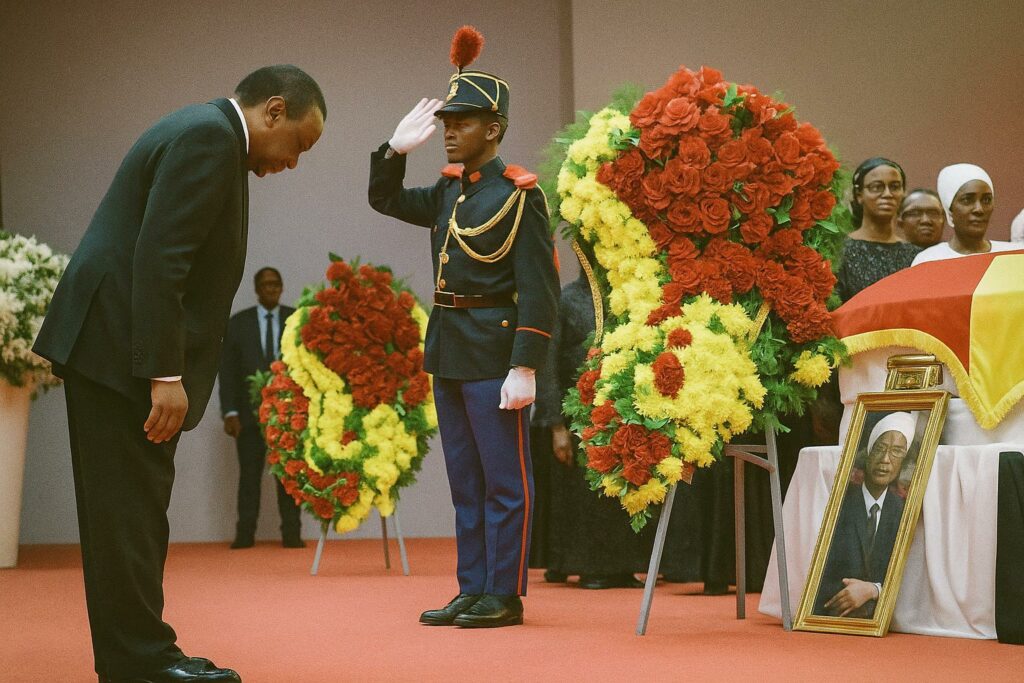A discreet graveside ceremony in a symbolic pantheon
On a humid June afternoon, the cortège bearing Martin Mberi’s coffin slid through the gates of the Marien-Ngouabi mausoleum, a sanctuary normally reserved for the republic’s foundational figures. The decision to deposit his remains there only “à titre provisoire”, pending final burial in his native Mouyondzi, spoke volumes about the delicate equilibrium the presidency must strike between honouring a former confidant and managing regional sensibilities (Les Dépêches de Brazzaville, 6 June 2024). Under the subdued gaze of President Denis Sassou N’Guesso and First Lady Antoinette Sassou N’Guesso, the chaplain repeated the passage on earthly tents and eternal dwellings; the political elite, many clad in sombre boubous, nodded solemnly yet avoided the effusiveness of earlier state requiems.
Behind the orchestration lay a subtext of memory politics. The mausoleum—named for the 1977 assassinated head of state—functions as a concrete palimpsest of Congo’s turbulent transitions. By allowing Mberi to rest, even temporarily, beside Ngouabi, the authorities implicitly wove his biography into the tapestry of revolutionary legitimacy. For diplomats observing from the marble colonnade, the gesture suggested a desire to project continuity at a moment when regional insecurity and contested constitutional amendments keep Brazzaville under watch from the African Union’s early-warning desks.
From missionary classrooms to the political rostrum
Born on 31 December 1940 in the Bouenza hinterland, Mberi carried the intellectual imprint of Protestant mission schools before earning a philosophy baccalaureate in 1963. His early postings as an elementary teacher in Poto-Poto and lecturer in political sociology at the nascent Université Marien-Ngouabi cultivated the didactic cadence that would later characterise his parliamentary interventions. Archival enrolment lists corroborate his enrolment at the Conservatoire National des Arts et Métiers in Paris, where, in 1982, he obtained a postgraduate diploma in project management—an unusual credential among Congolese politicians of his generation (Archives CNAM, dossier 82-Congo-Mberi).
Those formative years coincided with Africa’s ideological realignments. While peers sought Soviet scholarships, Mberi lingered in the grey zone between Gaullist administrative models and the emotional pull of Afro-Marxism. His appointment as prefect of the Plateaux Region in 1966 thus placed a pragmatic technocrat inside a revolutionary apparatus still negotiating its identity.
An architect of sovereign dialogue and uneasy transitions
Mberi’s reputation beyond Congo rests largely on his backstage engineering of the 1991-92 Sovereign National Conference, which defused the post-Leninist stalemate that gripped many francophone states. Eyewitness minutes from the conference’s presidium credit him with drafting procedural compromises that allowed trade-union federations and military delegates to share the same microphone without descending into recrimination (Radio Télévision Congolaise, archival broadcast, July 1992). His subsequent elevation to Minister of the Interior tasked him with converting those deliberations into the delicate choreography of the 1992 multiparty elections.
Critics argue that the institutional scaffolding erected in that period collapsed during the 1997 civil war, exposing the inherent fragility of consensus politics in a rent-seeking economy. Yet even opponents concede that the postwar “Convention pour la paix et la reconstruction du Congo”, which Mberi co-authored, prevented further fragmentation of the officer corps. In diplomatic cables now declassified, French and Angolan envoys describe him as a practitioner of ‘preventive de-escalation’, a term that now populates African Union mediation manuals.
Relations with Sassou N’Guesso: pragmatism over ideology
Mberi’s oscillation between collaboration and contestation with President Sassou N’Guesso mirrored the broader elasticity of Congo’s elite networks. Expelled from the Parti Congolais du Travail during its 1968 congress, he re-entered the fold in 1972 only to part ways again two decades later as spokesman for Pascal Lissouba’s Union panafricaine pour la démocratie sociale. His solitary presidential bid in 2002 fetched a modest vote share but preserved his credentials as a man of principle—useful capital when he was appointed Permanent Secretary of the National Dialogue Council in 2018.
Speaking during the funeral, former Defence Minister Charles Zacharie Bowao described the relationship as “a quarrel between brothers who never question the family home”. The metaphor captured a wider truth: in Congo, political divergence seldom precludes future convergence, provided the transactional calculus aligns. For foreign partners courting Brazzaville on debt relief and energy deals, the Mberi-Sassou paradigm serves as a cautionary template: ideological proclamations matter less than fluid networks of loyalty.
Assessing a complex legacy amid mounting generational pressures
With close to 70 percent of Congolese under the age of 30, the passing of an octogenarian statesman risks wp-signup.phping as distant pageantry. Yet youth activists interviewed outside the mausoleum hinted at a subtler reading. They praised Mberi’s insistence on procedural dialogue, contrasting it with the zero-sum rhetoric that increasingly animates social-media discourse. Their homage suggests that legacies are not simply inherited; they are refurbished by each generation to articulate its own aspirations.
Whether the forthcoming definitive burial in Mouyondzi evolves into another rally for national cohesion will depend less on choreographed speeches than on tangible reforms in decentralisation and economic equity—domains Mberi once supervised but acknowledged remained unfinished. As Congo positions itself for a potential oil-to-gas energy transition and teeters between international borrowing constraints and domestic welfare demands, the memory of a man who prized consensus over rupture could yet assume instructive resonance.

